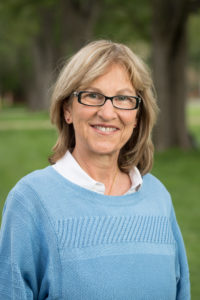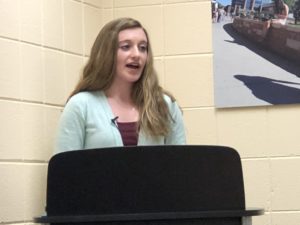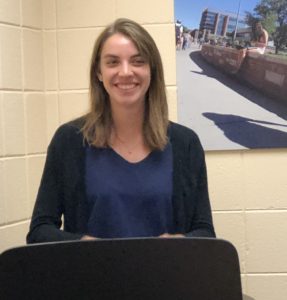Kate Browne, professor of anthropology at Colorado State University, tried something new this semester. She offered a pilot course for undergrads called “Public Anthropology.”
“This course came out of my interest in helping students understand the power of engaged scholarship to solve global problems,” Browne says. “There are so many ways we can impact real lives and policies. We can help people who are non-specialists grasp the complexity of issues we are facing.”

With a focus on global environmental challenges, from climate change to global health issues to natural disasters, Browne developed the course around two ideas: assign scholarly material that was written for broader public audiences; and help students learn to organize and write their insights and analyses for those same audiences. One of the assignments included writing op-ed pieces, five of which were published in major newspapers.
Five op-eds published
Lucy Shepherd’s piece “Polluting Houston neighborhoods wasn’t entirely an ‘Act of God’” was published by The Texas Tribune on April 13. Lauren Burr’s article “In nature, nothing exists alone” was published on Feb. 24 by The New Mexican in Santa Fe. Then on March 27, Burr’s piece “Preserving human dignity amid disaster” also ran in the PressReader, a syndicated compilation of top stories from newspapers around the world. She had another op-ed published in the New Mexican on May 17. And The Greeley Tribune ran Alexiss Thomas’ op-ed “Disasters hit the most vulnerable hardest” on March 12. The combined circulation of the four publications is significant.
In addition to writing opinion pieces, each student kept a weekly blog developed around the reading for a given week, and in another assignment, the students took an academic journal article and rewrote it to get across the primary points in a more accessible way. It was written in the form of a letter that got snail-mailed to a friend or family member.
“I want students to understand that clear and accessible writing does not mean making something simple that is inherently complex,” Browne said. “Making scholarship public means eliminating jargon, thinking a lot about organization, using lively and effective language, and paying attention to the audience.”

Their final project? Write a high school commencement speech and deliver it in front of the class. Several of those addresses were recorded and posted on YouTube, including one by Burr and one by Herman.
‘Opportunity to use my voice’
“This course helped me realize my education in anthropology is not limited to just doing academic research; that my knowledge is useful when put into the hands of the public,” said senior anthropology major Beth Herman. “Being able to work on assignments that were shared with a public audience was the most rewarding experience. This class gave me the opportunity to use my voice in a unique way which other courses in anthropology had not yet offered.”
“So much of what we work on in undergrad gets placed in a stack of paper in a box somewhere to be recycled in a few years,” added Burr. “But public anthropology is the chance to share what I’m learning with a wider audience. We are within reach of solving our world’s biggest challenges, but we can’t do it without sharing the research that will get us there.”
Browne agreed.
“Scholars operate as a closed community too often,” she said. “And it can be disheartening to be a scholar right now because of the increasing reliance on non-evidence-based information. People can say whatever they want and it spreads fast, thanks to technology. This public anthropology approach is vitally important to creating pathways into the community. I wanted the students to create their own pathways.”

Making research accessible
Browne added that peer-reviewed journal articles are commonly long, jargon-laden, and live behind paywalls that are not easily found by the general public. Public anthropology is about making university research and expertise accessible and part of real-world solutions.
“We’re graduating really bright people, and they have the capacity to take what they’ve learned out into the world,” she said. “We’re moving into an era of engaged scholarship, and high-impact teaching can offer students incomparable opportunities to make their work count. And when their work counts, they are likely to become more engaged citizens who understand how to research problems and talk about them with others in ways that don’t diminish the arguments that scholars are concerned about holding onto.”
“While we learned of numerous struggles facing marginalized, victimized, and powerless people, we also discussed the solutions to these struggles,” Burr explained. “Personally, this class has given me optimism when I thought there was none, while still engaging with critical understandings of complex issues.”
Browne said she plans to offer the course again in the future.
“This was a great experiment,” she said. “The students performed at an incredible standard. They knocked me out with what they are capable of.”
